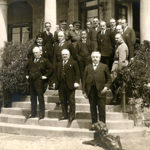Published August 3, 2004
Financial Times
Martin Wolf: We need a global currency
By Martin Wolf
Financial Times: August 3 200419:35
Last month was the 60th anniversary of the conference at Bretton Woods, New Hampshire, that inaugurated the post-second world war international economic order. The flood of analysis that this occasion brought forth has concentrated on that meeting’s institutional progeny: the International Monetary Fund and the World Bank. But a bigger question needs to be addressed. It is whether floating exchange rates have proved to be the ideal replacement for the unsustainable adjustable exchange-rate pegs of the Bretton Woods monetary regime. The answer is: no.
Consider the following features of the world economy today: the world’s richest country is, far and away, its biggest capital importer and net debtor; the two periods of sizeable net lending to emerging market economies over the past three decades ended in financial crises and sharp reversals in lending (see charts below); and, since the most recent set of global crises, emerging market economies have, in aggregate, accumulated enormous quantities of foreign currency reserves.
Participation in two recent conferences, both in Italy, has persuaded me that a single factor helps explain these phenomena: global currency instability. The first of these conferences – organised by the Aspen Institute Italia – discussed “how to live with imbalances”. The second – the Santa Columba conference, organised by Robert Mundell, the Nobel-laureate – considered “plans for a world currency”. Taken together, these meetings encouraged me to question a long-standing belief in the desirability of floating exchange rates.
Look back to the last period of economic globalisation – the era before 1914. Under the gold standard, all countries used what was in effect one currency. While currency risk existed, it was limited. Today, however, it is huge. Since the breakdown of the Bretton Woods system in 1971, currencies have fluctuated widely.
The concept introduced principally by Ricardo Hausmann, now at Harvard, to explain the consequences of currency instability for emerging market economies is “original sin”. This catchy phrase refers to “the inability of a country to borrow abroad in its own currency”.* Ninety-seven per cent of all debt placed in international markets between 1999 and 2001 was denominated in just five currencies: the US dollar, the euro, the yen, the pound sterling and the Swiss franc. Even well-run emerging market economies, such as Chile, cannot borrow in their own currencies.
Whatever the explanation for this difficulty, the limited currency composition of global lending has powerful consequences for capital flows. By definition, net borrowing then creates a potentially lethal currency mismatch. When a currency falls sharply, net borrowers will experience large balance sheet losses. Many financial institutions will be wiped out as a result of the insolvency of any debtor that is burdened by large net foreign currency liabilities.
Having either experienced this pain or watched other countries do so, competently run emerging market economies have tried to limit their net foreign currency liabilities. This has been particularly true of the Asian emerging market economies. These countries have attempted to preserve robust current account positions. They have also recycled inflows of foreign direct investment into official holdings of foreign currency assets, principally US treasury securities. Fortunately for them, it is vastly easier to keep currencies down than to prevent them from collapsing. Indeed, given the very low interest rates of the savings-surplus countries of east Asia, sterilisation of the monetary consequences of exchange-rate intervention aimed at keeping the rate down is close to costless.
Yet this does not end the dilemmas confronting such emerging economies. As Ronald McKinnon of Stanford University has argued, the more successful countries are in strengthening their balance of payments and limiting net foreign currency liabilities, the more they will suffer from “conflicted virtue”.** They will, in other words, find themselves under growing political pressure to allow their currencies to appreciate.
Such appreciations risk pushing low-inflation countries into deflation and, perhaps, even into a liquidity trap of the kind suffered by Japan in the 1990s. That has been a concern to China. Letting the currency appreciate while offsetting the contractionary impact through expansionary macroeconomic policies would risk creating a current account deficit. Should equity inflows halt, this would have to be financed by potentially destabilising net foreign borrowing.
Now consider the consequences of a world in which emerging market economies, in aggregate, wish to limit net foreign currency borrowing, sustain robust positions in their underlying balance of payments and resist pressures for currency appreciation. Presume, in addition, that the world also contains rich, ageing societies with structural excesses of savings over investment and so enduring current account surpluses: Japan is the most important, but far from only, example.
We would then expect the net private capital flow to emerging market economies to take the predominant form of equity investment, as we observe. We would also expect macroeconomic balance in the world economy as a whole to require at least some of the countries that can borrow easily in their own currencies to run large current account deficits. The US is, of course, the paramount example.
A world in which borrowing abroad is hugely dangerous for most relatively poor countries is undesirable. A world that compels the anchor currency country to run huge current account deficits looks unstable. We should seek to lift these constraints. The simplest way to do so would be to add a global currency to a global economy. For emerging market economies, at least, this would be a huge boon.
I am well aware of the economic and political objections to this idea. But if the global market economy is to thrive over the decades ahead, a global currency seems the logical concomitant. In its absence, the world of free capital flows will never work as well as it might. This is a world I am unlikely ever to see. But maybe my children or grandchildren will do so.
* Barry Eichengreen, Ricardo Hausmann and Ugo Panizza, “Currency Mismatches, Debt Intolerance and Original Sin”, NBER Working Paper 10036;
** Ronald McKinnon and Gunther Schnabl, “The return to soft dollar pegging in east Asia”, International Finance, forthcoming
Why we need to move to a global central bank
By James Stodder
Financial Times: August 3 2004
From Dr James Stodder.
Sir, Martin Wolf’s otherwise excellent article on the World Trade Organisation negotiations (“A failure in Geneva would be a disaster for the world”, July 28) did not mention the need for global macroeconomic stability to complement the continued lowering of trade barriers. Yet we see from his first paragraph that world gross domestic products and exports in the quarter-century following the Bretton Woods currency-fixing agreements grew about twice as fast as over the most recent quarter-century. Anti-globalists can point to these lower growth rates as evidence that trade liberalisation has not worked.
The current period has of course been characterised by regional currency crises and the risk of a truly global crisis remains. The correct lesson is to reaffirm Keynes’s original Bretton Woods vision. However politically difficult the goal, we need to move toward a global central bank.
James Stodder, Clinical Associate Professor, Lally School of Management and Technology, Rensselaer Polytechnic Institute at Hartford, Hartford, CT 06120, US
Reserve currency problems need golden solutions
By John D Mueller
Financial Times: August 20 2004
From Mr John D. Mueller.
Sir, Martin Wolf is almost alone among journalists in casting a much-needed spotlight upon the problems stemming from the dollar’s use as the world’s chief official reserve currency. But, in doing so, he also reveals the lack of an agreed and consistent analysis of this issue among experts. For example, in his article “America is now on the comfortable path to ruin” (August 17), Mr Wolf cited the interesting analysis of Wynne Godley, Alex Izurieta and Gennaro Zezza, which concluded that “net exports must now be the motor for US growth”. This was to be accomplished by “a further substantial devaluation of the dollar, together with a sizeable rise in domestic demand, relative to potential output, in almost all other important economies of the world”.
But in his article “Asia’s game with America is a long way from ending” (August 11), Mr Wolf had suggested why attempts to cure the US payments deficit by dollar devaluation cannot work as long as the dollar remains the world’s chief official reserve currency. Any tendency for the dollar to decline is automatically met by massive dollar purchases by foreign (especially Asian) central banks, thus financing – and perpetuating – the US balance of payments deficit. Asian “mercantilism” and American “profligacy” are merely two sides of the same coin.
Earlier, in his article “A global market economy needs a global currency” (August 4), Mr Wolf cited Prof Robert Mundell on the need for a new global reserve currency to replace the dollar, à la Keynes’ bancor plan. But if we think it through, in the absence of world government, any global official paper currency would have the same basic problem as the dollar: one nation’s reserve asset depends on the worth of some other government’s IOU.
Jacques Rueff pointed out the problem 40 years ago when he first described America’s “deficit without tears”. By a process of elimination, Rueff came to an unfashionable but thoroughly logical conclusion: to solve the US, Asian, and global problems simultaneously, official global money must be one nation’s asset without being any national government’s liability: a reproducible commodity such as gold.
John D. Mueller, LBMC, Washington, DC 20015, US
Gold standard: there is a better way
By James Stodder
Financial Times: August 26 2004
From Dr James Stodder.
Sirs, In his response to Martin Wolf’s call for a global currency, John D. Mueller (Letters, August 20) calls for a renewed gold standard. Not only would this require the leading financial nations of the world to jettison their largely successful monetary policies; it would also abandon all hope of a coherent global monetary policy.
There is a better way. Mr Mueller is half right when he states that “in the absence of world government, any global official paper currency would have the same basic problem as the dollar: one nation’s reserve asset depends on the worth of some other government’s IOU”. Yes, but not necessarily any individual nation’s IOU. And it would require world governance, rather than government. The European monetary union shows that a global currency need not be the same as a global government – although it is certainly a step in that direction.
James Stodder, Clinical Associate Professor, Lally School of Management and Technology, Rensselaer Polytechnic Institute at Hartford, Hartford, CT 06120, US
Dollar reserve debate moves on two levels but without agreement
Financial Times: September 1 2004
From Mr. John D. Mueller.
Sir, As the continued response indicates, Martin Wolf’s series on the perils of the dollar-reserve system has touched a nerve. But the absence of an agreed analysis still hinders our understanding of it. The debate has moved on two levels, diagnosis and cure, without reaching agreement on either.
The exchange between Marc Chandler (Letters, August 23) and Martin Wolf (“Why the US current account deficit is a cause for concern”, August 25) advanced a consensus that the US current account, equalling the difference between conventionally defined saving and investment in both the US and the rest of the world, must be jointly determined. But there is a general failure to recognise that, under the reserve-currency system, the current account balance is not equal and opposite to net private investment flows, as almost everyone implicitly assumes. This assumption underlies Mr Chandler’s equation of gold and dollar reserves in his charge of mercantilism against Mr Wolf, but also Mr Wolf’s emphasis on restoring balance in the US current account, rather than the current and private investment accounts combined.
As I have noted (Letters, August 20), while gold is an asset to the holder without being anyone else’s liability, dollar assets of foreign central banks are ultimately liabilities of the US government. This has an important corollary: every reserve dollar acquired by a foreign central bank entails an equal excess of US private payments abroad for trade and investment combined, over such payments received. Flows of such “hot money” were demonstrably the cause of the Japanese stock market bubble of the late 1980s, the emerging-markets crises of the 1990s and, most recently, the sharp world-wide rise of energy prices. This is the payments deficit to worry about, and it is inherent in any reserve-currency system.
James Stodder (Letters, August 26) concedes that my Rueffian diagnosis is “half right” but objects that the Rueffian cure of gold money would force leading nations “to jettison their largely successful monetary policies” and argues (pointing to the European Central Bank) that the liabilities of a world monetary authority would “not necessarily [be] any individual nation’s IOU”. To these arguments there are straightforward responses.
First, if recent policies were “largely successful”, success is a very relative term. In the largest countries, the last 20 years, while much better than the previous 15, were far inferior to the 1879-1914 international gold standard, measured by both the absolute change and year-to-year volatility of the Consumer Price Index. As just noted, the experience in other countries has been disastrous. Second, the European central banks were established by treaty among national governments, and ECB liabilities are indeed “individual nations’ IOUs”, although expressed in a common currency. (Imagine the ECB, say, unilaterally selling France’s gold without France’s co-operation.) The flouting of EU fiscal rules by its largest members also suggests caution rather than enthusiasm for including the US in such an experiment at the world level.
I have no fetish for gold; like Rueff, I merely discovered that the alternatives were eliminated by their real-world performance. And central banks are sitting on a billion ounces of the stuff.
John D. Mueller, President, LBMC, Fellow, Lehrman Institute, Washington, DC 20015, US












